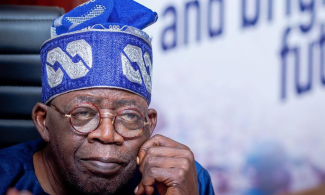
The groups – The Publish What You Pay (PWYP), Nigeria, and the Community Outreach for Development and Welfare Advocacy (CODWA) – made the appeal in a statement issued on Monday, titled: "EITI 2023 Validation Report On Nigeria: Call For Urgent Remediation.”
Nigerian president, Bola Tinubu, has been urged by civic groups to implement the key recommendations for the nation's extractive industries as contained in the 2023 EITI Validation Report on Nigeria.
The groups – The Publish What You Pay (PWYP), Nigeria, and the Community Outreach for Development and Welfare Advocacy (CODWA) – made the appeal in a statement issued on Monday, titled: "EITI 2023 Validation Report On Nigeria: Call For Urgent Remediation.”
Signed by National Coordinator Publish What You Pay (PWYP), Nigeria, Comrade Taiwo Otitolaye and Adebayo Titus of Community Outreach for Development and Welfare Advocacy (CODWA), in a joint statement, the groups stated that the validation exercise, conducted by EITI was a quality assessment mechanism for measuring progress in implementing EITI standard and ensuring compliance to its requirements by member countries.
According to the statement, the current EITI ranking of Nigeria has negative implications on the economy, warning that the drive for foreign investments into the country's oil, gas, and mining sectors may be jeopardised.
"Greater government oversight of the Nigeria Extractive Industries Transparency Initiative (NEITI) Secretariat, its financial management and recruitment practices," was one of the recommendations the global EITI made in its recent validation report, according to the statement.
While EITI called on Nigerian government to ensure active participation and effective engagement of extractive companies in the EITI process in Nigeria, the report also recommended that the government should ensure that "civil society is fully, actively and effectively engaged in all aspects of EITI process."
This recommendation, the civic organisations stated, was a critical component of the global body to ensure free and independent participation of civil society.
"The report further recommended that the government should ensure that the Stakeholders Group (MSG) overseeing the EITI process is consistently constituted in a timely manner and that there is sufficient opportunity for the broader industry and civil society consistencies to freely and independently nominate their representatives into the National Stakeholders Working Group (NSWG), among others. And that more CSOs inclusion on the NSWG is highly recommended.
"The global body believes that the "NEITI 2007 ACT" should be amended to reflect the reality of today," the group stated.
Although the civic organisations stated that Nigeria achieved a moderate score of 72 points in implementing the global EITI standard, according to the report, the overall score is an average of three components scores on - "stakeholders engagements; transparency; outcomes and impacts."
"On the outcomes and impacts component, Nigeria achieved a high score of 92 points. The country scored a moderate 71.5 points on the transparency component and recorded fairly low points of 52.5 on the stakeholders engagements component. Nigeria was awarded 2 additional points for the effectiveness and sustainability of its EITI implementation.
"The global body said Nigeria will have to implement all recommendations and corrective actions identified in the report before the next validation exercise, commencing January 2026, or face suspension.
"The current EITI ranking of Nigeria has negative implications on the economy and the drive for foreign investments into the country's oil, gas, and mining sectors.
"The current EITI ranking of Nigeria is actually a backsliding from where the country was before the recent validation exercise. The last validation exercise was conducted in 2019 when Nigeria was adjudged
"Satisfactory Progress" which represented the highest ranking any member countries of the global EITI can attain at the time.
"This unfortunate backsliding by Nigeria in the global EITI ranking is a reflection of a weak institution, poor stakeholders engagement, low transparency and accountability process. All these have negative implications for investors' confidence and growth of the extractive sector.
"The EITI validation report is taken very seriously by foreign investors, multi-lateral institutions, and development agencies when making investment decisions.
"Nigeria's fairly low score in stakeholders engagement component, particularly the extractive companies, indicates their lack of confidence in the EITI process in Nigeria, with implications on investment decisions.
"The Presidency and other agencies with oversights functions need to act swiftly and implement these key recommendations and other reforms to enable effective EITI implementation in Nigeria," the statement partly read.